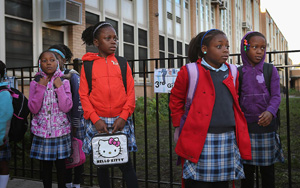
Segregating schools by race still seems to be a major issue in many towns and cities across America. Are we going backward, sixty years after Brown vs. Board of Education determined that segregated schools by race do not promote or achieve equal educational opportunity?
Now, yet again, a federal judge is ordering mediation to resolve a dispute over racial segregation in Huntsville, Alabama city schools. This is just one of many such instances and they are not confined to the South. Some of the most segregated schools can be found in New York City, Boston, Massachusetts and other eastern and northern states. The same came be said of school disticts in some western cities like Los Angeles.
In the case of Huntsville, like so many others school districts in other cities, the Justice Department is objecting to the system's current rezoning plan, arguing it would lead to more students attending class in segregated environments.

This issue has been an ongoing one where the district and the government has submitted districting plans, but U.S. District Judge Madeline Hughes Haikala has rejected both of them and ordered the talks as the city attempts to draw new district lines for its school zones.
Any rezoning has to be approved because of a desegregation lawsuit dating back to 1963, where the federal government sued to end racial segregation in the system.
Since desegregation remedies have been in place, Huntsville schools are now about 40 percent black and 60 percent white. Judge Haikala, along with others in the community readily acknowledge that segregation continues.
Not only does segregation continues but all of the inequities in educational achievement, job, and economic opportunities and other quality of life issues that still undermine how great America could be.
